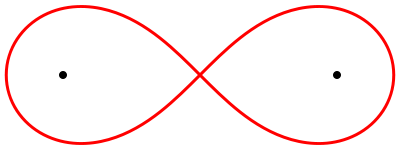Lemniscatic elliptic function
In mathematics, a lemniscatic elliptic function is an elliptic function related to the arc length of a lemniscate of Bernoulli studied by Giulio Carlo de' Toschi di Fagnano in 1718. It has a square period lattice and is closely related to the Weierstrass elliptic function when the Weierstrass invariants satisfy g2 = 1 and g3 = 0.
In the lemniscatic case, the minimal half period ω1 is real and equal to
where Γ is the gamma function. The second smallest half period is pure imaginary and equal to iω1. In more algebraic terms, the period lattice is a real multiple of the Gaussian integers.
The constants e1, e2, and e3 are given by
The case g2 = a, g3 = 0 may be handled by a scaling transformation. However, this may involve complex numbers. If it is desired to remain within real numbers, there are two cases to consider: a > 0 and a < 0. The period paralleogram is either a "square" or a "diamond".
Lemniscate sine and cosine functions
The lemniscate sine and cosine functions sl and cl are analogues of the usual sine and cosine functions, with a circle replaced by a lemniscate. They are defined by
where
and
They are doubly periodic (or elliptic) functions in the complex plane, with periods 2πG and 2πiG, where Gauss's constant G is given by
Arclength of lemniscate

consists of the points such that the product of their distances from the two points ( 1⁄√2, 0), (− 1⁄√2, 0) is the constant 1/2. The length r of the arc from the origin to a point at distance s from the origin is given by
In other words, the sine lemniscatic function gives the distance from the origin as a function of the arc length from the origin. Similarly the cosine lemniscate function gives the distance from the origin as a function of the arc length from (1, 0).
See also
References
- Abramowitz, Milton; Stegun, Irene Ann, eds. (1983) [June 1964]. "Chapter 18". Handbook of Mathematical Functions with Formulas, Graphs, and Mathematical Tables. Applied Mathematics Series. 55 (Ninth reprint with additional corrections of tenth original printing with corrections (December 1972); first ed.). Washington D.C., USA; New York, USA: United States Department of Commerce, National Bureau of Standards; Dover Publications. p. 658. ISBN 0-486-61272-4. LCCN 64-60036. MR 0167642. ISBN 978-0-486-61272-0. LCCN 65-12253.
- Reinhardt, W.P.; Walker, P.L. (2010), "Lemniscate lattice", in Olver, Frank W. J.; Lozier, Daniel M.; Boisvert, Ronald F.; Clark, Charles W., NIST Handbook of Mathematical Functions, Cambridge University Press, ISBN 978-0521192255, MR 2723248
- Siegel, C. L. (1969), Topics in complex function theory. Vol. I: Elliptic functions and uniformization theory, Interscience Tracts in Pure and Applied Mathematics, 25, New York-London-Sydney: Wiley-Interscience A Division of John Wiley & Sons, ISBN 0-471-60844-0, MR 0257326
External links
- Hazewinkel, Michiel, ed. (2001), "Lemniscate functions", Encyclopedia of Mathematics, Springer, ISBN 978-1-55608-010-4